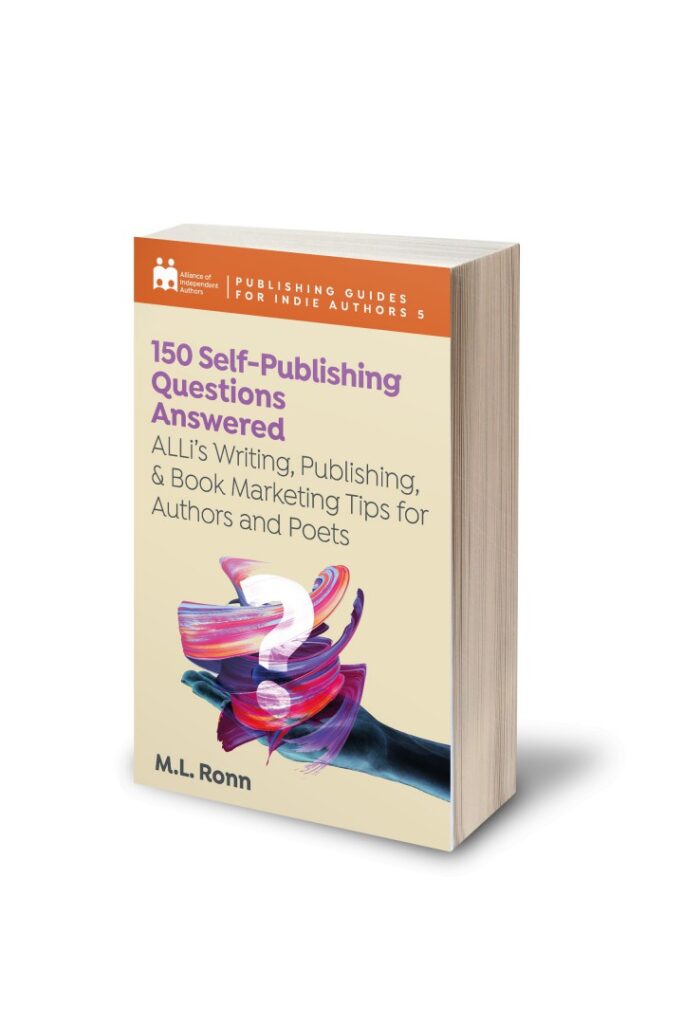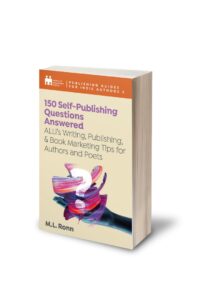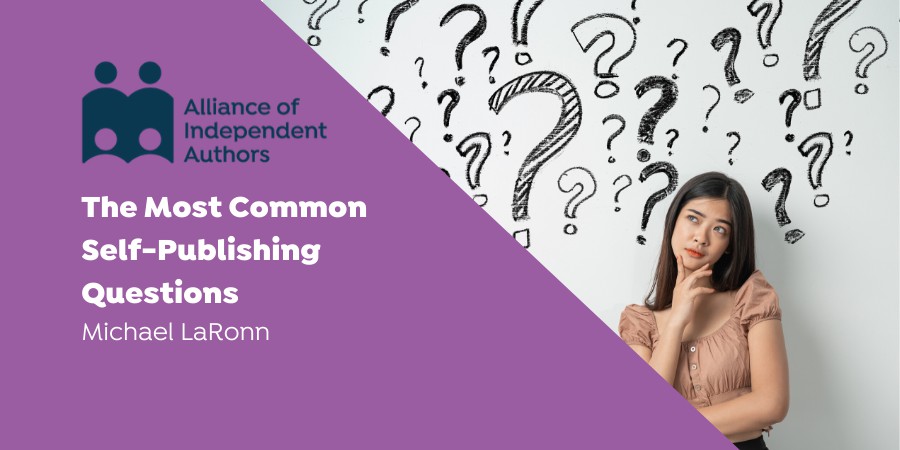The following is an excerpt from ALLi’s new guidebook, 150 Self-Publishing Questions Answered: ALLi’s Writing, Publishing, and Book Marketing Tips for Authors and Poets, written by ALLi’s Outreach Manager M.L. Ronn (Michael La Ronn). In this section, Michael tackles how to distribute and manage your ebook at retailers like Amazon and Google Play, how to make your book free, and more. Read this post to get a taste of the book, and listen to the audiobook excerpt narrated by Michael below.
 ALLi members can download their complimentary ebook copy of 150 Self-Publishing Questions Answered in the Member Zone. Navigate to allianceindependentauthors.org and log in. Then navigate to the following menu: BOOKS > GUIDEBOOKS. Other formats are available to members and non-members in ALLi’s Bookshop
ALLi members can download their complimentary ebook copy of 150 Self-Publishing Questions Answered in the Member Zone. Navigate to allianceindependentauthors.org and log in. Then navigate to the following menu: BOOKS > GUIDEBOOKS. Other formats are available to members and non-members in ALLi’s Bookshop
Self-Publishing Questions Answered: Should I put my books in Kindle Unlimited?
This is one of the most important early decisions you will have to make in your author business.
Do you keep your book exclusive to Amazon’s KDP Select Program in exchange for the multitude of benefits and visibility the program provides, or do you “go wide” and publish your book everywhere?

Michael La Ronn
For fear of making this book outdated, I won’t go into the details of what KDP Select offers, as the offerings change from time to time. However, at the time of this writing, Kindle Unlimited is one of KDP Select’s biggest selling points. Authors are paid based on the number of pages in their books that readers read each month. Kindle Unlimited can be lucrative, and many writers make a living on their KU income alone.
ALLi’s opinion (which aligns closely with mine) is to avoid exclusivity whenever possible. Yes, it’s true that KDP Select goes in ninety-day terms, so it’s not permanent exclusivity, and yes, it’s true that you can pull your books in and out at any time, but the best way to have a sustainable author business is to develop income from many different sources. That way, you’ll be insulated somewhat if one of them dries up. If you rely on Amazon for your income, and Amazon makes a change to KDP Select, you’ve just lost all your income.
That said, there’s nothing wrong with using KDP Select strategically. If it’s your first book and you need some income to help you get on your feet, there’s nothing wrong with being exclusive for a short time. But in the bigger picture of your career, you’ll do yourself more favors long term by being nonexclusive and diversifying your income.
A common counterargument to this is that, if you go wide, you don’t make money at other retailers that matches what you can make on Amazon. While that may be true in the short term, it’s also true that it takes a long time to build an audience on other retailers, sometimes many years. The longer you wait to go wide, the longer it will take you to build those audiences.
Self-Publishing Questions Answered: If I put my book in KDP Select, can I publish it anywhere else?
No and yes.
You cannot publish your e-book anywhere else if you are enrolled in KDP Select. There is no way around this, and if you try to circumvent it, you will get a nasty letter from Amazon. They might even terminate your account.
However, Amazon exclusivity is for your e-book only. That means you can still publish your paperback, hardcover, and audiobook anywhere you like.
Self-Publishing Questions Answered: How can I make my e-book free?
Free books can be a good promotional tool. Some authors like to make a certain book in their catalogue permanently free (“permafree”) to drive sales for their other books.
Many retailers allow you to set your book’s price to free.
Amazon, however, does not, but its bots will price-match your book if it is offered for lower somewhere else. If you set your book for free on other retailers, Amazon will eventually price-match your book.
Self-Publishing Questions Answered: Should I use an e-book aggregator or go direct to book retailers like Apple Books and Google Play?
e-book distributors (also known as e-book aggregators) are a great way to expand your reach. Sites like PublishDrive, Draft2Digital, and StreetLib allow you to upload your book once, and they distribute it to many of the major retailers in exchange for a commission. They can get your book into retailers that you can’t on your own, ones you’ve probably never even heard of.
All e-book aggregators have unique offerings and you need to investigate which one is best for you.
To answer the question of whether to use an aggregator or go direct, why not both? Wherever possible, I recommend uploading directly to a retailer if they offer a dashboard. You’ll have more control. Use the e-book aggregators to expand your reach into markets you can’t tap directly.
Self-Publishing Questions Answered: Google Play keeps discounting my e-book. What do I do?
 Google Play uses a different pricing model than other retailers. It’s called the wholesale model, which is where the book publisher sets a recommended price of the book, but the retailer can discount the price in order to sell it.
Google Play uses a different pricing model than other retailers. It’s called the wholesale model, which is where the book publisher sets a recommended price of the book, but the retailer can discount the price in order to sell it.
On Amazon (for e-books), you set the price of your book, and Amazon takes a commission. This is how most retailers operate and it’s called agency pricing. Amazon doesn’t discount your e-book unless your book is cheaper elsewhere. And if it is cheaper elsewhere, Amazon simply matches the price.
Google, however, uses wholesale pricing for e-books. Therefore, it will discount your book, usually to odd price points. The best way to make sure your book sells at a price point you want is to raise the price.
Self-Publishing Questions Answered: All Formats
150 Self-Publishing Questions Answered is available in e-book, audio and print formats. This is ALLi's first audiobook, available through all popular audiobook stores. You can listen to a snippet here:
ALLi members can download their complimentary ebook copy of 150 Self-Publishing Questions Answered in the Member Zone. Navigate to allianceindependentauthors.org and log in. Then navigate to the following menu: BOOKS > GUIDEBOOKS. Other formats are available to members and non-members in ALLi’s Bookshop





Hello Michael,
Andreas here, may i download your podcast?
p.s. love your post
Regards
Thank you for this post, Michael (and Orna). I’ve been so inspired by your podcasts and excerpts that instead of simply buying your book, I will be joining ALLi! The organization provides so much value for NON-members, but I can’t wait to derive all the more from being a member. Thank you so much!
Something to bear in mind when going direct with Kobo is that Kobo has lots of partner stores –
WH Smith (UK), WH Smith (UK), Fnac (France), Price Minister (France), Fnac (Portugal). Livraria Cultura (Brazil), Angus & Robertson (Australia), Booktopia (Australia), Indigo (Canada ), Bol (Netherlands), Rakuten (Japan), Walmart (US), Feltrenelli (Italy), Mondadori (Italy)
as well as its dedicated territorial sites, making is a valuable asset in going global.
But…if you go direct via Kobo Writing Life without your own ISBNs then many of these partner stores will not receive your titles. Not because they are anti-indie but because their system requires a valid ISBN, not a Kobo (or other third party) identifier.
Indies without their own ISBNs sending titles to Kobo via *most* aggregators will have a free ISBN assigned by the aggregator and thus get this additional reach.
This goes some way to explaining why some indies report better sales on Kobo via an aggregator than via KWL.
This is a great point. Indie authors need to use their own ISBNs if their books are to count in statistics and if they are to be the publisher of record. See ALLi’s “Guide to ISBNs” here: https://selfpublishingadvice.org/isbns-for-authors/